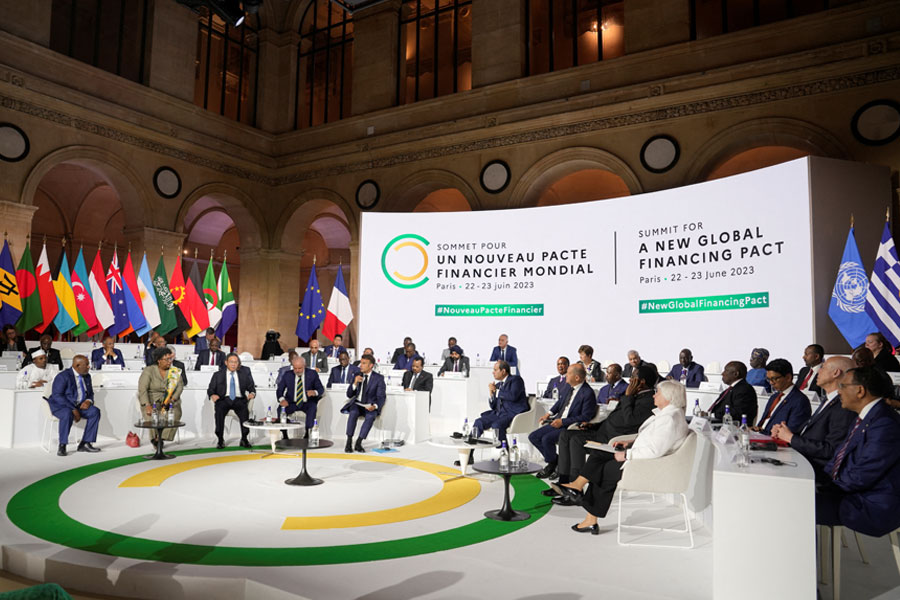
Radar | Aug 26,2023
A day before Finance Minister Ahmed Shide travelled to Mogadishu to attend the inauguration of Somalia's President, Hassan Sheikh Mohamud; he faced question time in parliament. His address to Ethiopia's federal legislators last week was quite a chill of the tumultuous times ahead. Ethiopians are confronted with hard choices, and the dry season will require tightening of belts.
It is a major departure from the narrative spun by the incumbent Prosperity Party (PP) of which the Minister is a member of the executive committee. Ahmed's address was also unlike budget presentations legislators have grown used to, which resemble a political pep rally for the ruling party, focused on economic achievements and claimed successes on the development front. Minister Ahmed emphasised the need to reprioritise federal expenditures despite the proposed budget bill is nearly 112 billion Br higher than what had been apportioned for this fiscal year.
The administration of Prime Minister Abiy Ahmed (PhD) motioned lawmakers to approve a 786.6 billion Br budget for the coming fiscal year. In dollar terms, the budget represents almost three billion dollars more than the current budget. However, more money is apportioned to recurrent expenditures, claiming close to 45pc of the budget. It is a trend that began in 2017, after almost a decade of budgeting in favour of capital spending.
“The fiscal space that allowed the government to provide financing for development objectives is narrowing,” the Finance Minister told legislators.
During the federal budget hearings last month, his officials urged federal agencies to slash expenditures for the next year. However, they were met with a bloated appetite.
Experts say a simple observation can reveal where the government's priorities lie.
The growing share of recurrent expenditure shows that the focus is on sustaining the economy by covering administrative expenses, according to Alemayehu Geda (PhD), professor of economics at the Addis Abeba University.
The administration's officials argue that the budget is an expression of their objective to ensure reconstruction in the north damaged by the civil war. The Finance Minister cautioned Parliamentarians, the supermajority elected under the incumbent's ticket, that the budget bill would suffice only if the existing tenuous peace is sustained. This was a central theme of his message; Minister Ahmed repeated it three times.
The civil war has put a strain on the federal government's coffer.
The budget bill is 40pc higher than what lawmakers had approved for 2021/22 and around 16pc higher when accounting for the 122 billion Br supplementary budget approved last December.
Alemayehu argued that the overall budget adjustment is insignificant when calculated in dollar terms. The budget bill exhibits a 14pc rise in dollar terms.
The budget comprises four components: recurrent and capital expenditures, as well as subsidies to the regional states and financing projects under the millennium developmental goals. The recurrent budget has seen a 28pc increase from the current budget. Close to 236 billion Br (30pc of the budget) has been set aside for capital expenditures. Less than 200 billion Br has been apportioned to cover regional states' subsidies and pay for development projects.
What distinguishes the budget bill from its predecessors is the highest share the defence sector receives. This could be hardly surprising considering the militarised conflict that raged in the northern part of the country, covering three regional states and a resurgent insurgency in the southwest. Close to a quarter (84 billion Br) of next year's recurrent budget is earmarked for the Ethiopian National Defense Forces (ENDF). In the current fiscal year, the military received 90 billion Br, four-fold the initial budget Parliament approved in July 2021.
MPs raised concerns over the expenditure budgeted for the defence forces.
“The government should first ensure that citizens are well fed,” said Christian Tadelle, an opposition legislator from the National Movement of Amhara (NAMA).
Financing the bloated budget through the mobilisation of domestic revenues will be testing, conceded Minister Ahmed. A global pandemic, inflationary pressure across the world, civil war and political instability have depressed businesses, causing the federal government to lose 40 billion Br in this fiscal year.
“Over a quarter of the tax revenue planned for this year will not be collected,” the Finance Minister admitted.
Authors of the budget bill proposed to cover 61pc of the budget from domestic tax revenues. It will be an uphill task if history is the judge.
Ethiopia's tax-to-GDP ratio has been in a continued decline since 2013, reaching nine percent last year. It is much lower than the sub-Saharan African average of 17pc.
To make up for the loss, officials plan to introduce new forms of taxes, including a property tax. Experts disagree.
“They can broaden the tax base instead of introducing new categories,” said Arega Shumetie (PhD), a senior researcher at the Ethiopian Economics Association.
The federal government aspires to change this. In its 10-year plan for economic development, the administration targets to collect 2.6 trillion Br in annual tax, boosting the tax-to-GDP ratio to nearly 20pc.
“The target ignores the reality on the ground,” said Arega.
The budget deficit is projected at 308 billion Br next fiscal year. Deficit financing has become a growing concern for policymakers and pundits. The administration's officials projected the deficit to reach 3.5pc of the GDP, five percentage points lower than Cepheus Capital, a private equity firm, forecasted for the coming fiscal year. The federal government plans to finance 86pc of the deficit through borrowing from domestic sources, which has grown more common in recent years.
The central bank's treasury bill (T-bill) auctions have been the primary source to cover the deficit. Funds raised from the T-bills market have grown over five-fold after Prime Minister Abiy Ahmed's (PhD) administration adopted a policy measure to tie T-bill auctions to market forces in late 2019. The administration has since been using T-bills to reduce direct lending from the central bank to address its budget deficit.
Over the first half of this year, outstanding debt secured through selling the T-bills shot up 110pc to 253 billion Br.
“There's no better alternative,” said Minister Ahmed.
Alemayehu, the economics professor, see other options, such as infrastructure bonds. He warns that the administration might turn its attention to direct borrowing from the central bank if financing the budget deficit through T-bills becomes unattainable. It is a view informed by a track record.
“This has been the trend in the past,” he said.
The market's appetite for T-bills has diminished; close to 60pc of the 40 billion Br bills offered in July last year had seen no buyers. Compare this to the 35 billion Br offered four months earlier, which was oversubscribed by 10 billion Br.
Although officials urge that they are determined to avoid direct borrowing from the central bank in fear of exasperating inflation, the record shows otherwise.
Direct advances from the central bank grew by 52 billion Br at the end of last year and topped 113 billion Br in the first quarter of the current budget year. It was a staggering turnaround compared to 2019/20, when direct borrowing dropped from 123 billion Br to 31 billion Br the previous year.
Financing part of the deficit through foreign loans and grants has been the budget-making tradition. That was until two years ago when the civil war began, turning off donors and lenders. Last year, the United States and the European Union suspended development aid and direct budgetary support. They threatened economic sanctions over disappointment with the humanitarian and human rights crises in the Tigray Regional State.
Ethiopia had received a mere 135 million dollars last year in foreign aid or loans. Nonetheless, the authors of the budget bill hope they will raise 77 billion Br (1.4 billion dollars at the current exchange rate) from bilateral and multilateral institutions such as the World Bank and the IMF.
The loans and grants expected from external sources account for a tenth of the budget bill. It will be a tall order for the administration to secure the funds, short of peacefully resolving the ongoing war and militarized conflicts.
In what bordered on a post-war speech, Minister Ahmed warned of the hardships ahead.
“It's essential to use the available financial resource to the best of our abilities,” he told legislators. “This is the most important task awaiting the country.”
PUBLISHED ON
Jun 11,2022 [ VOL
23 , NO
1154]

Radar | Aug 26,2023

Exclusive Interviews | Jun 24,2023

Editorial | Jun 07,2025

Editorial | Apr 26,2025

Advertorials | May 29,2023

Fineline | Jun 08,2019

View From Arada | May 21,2022

Radar | Jun 15,2024

Radar | Oct 15,2022

Viewpoints | Aug 05,2023

Dec 22 , 2024 . By TIZITA SHEWAFERAW
Charged with transforming colossal state-owned enterprises into modern and competitiv...

Aug 18 , 2024 . By AKSAH ITALO
Although predictable Yonas Zerihun's job in the ride-hailing service is not immune to...

Jul 28 , 2024 . By TIZITA SHEWAFERAW
Unhabitual, perhaps too many, Samuel Gebreyohannes, 38, used to occasionally enjoy a couple of beers at breakfast. However, he recently swit...

Jul 13 , 2024 . By AKSAH ITALO
Investors who rely on tractors, trucks, and field vehicles for commuting, transporting commodities, and f...

Oct 18 , 2025
The political establishment, notably the ruling party and its top brass, has become p...

Oct 11 , 2025
Ladislas Farago, a roving Associated Press (AP) correspondent, arrived in Ethiopia in...

Oct 4 , 2025
Eyob Tekalegn (PhD) had been in the Governor's chair for only weeks when, on Septembe...

Sep 27 , 2025
Four years into an experiment with “shock therapy” in education, the national moo...